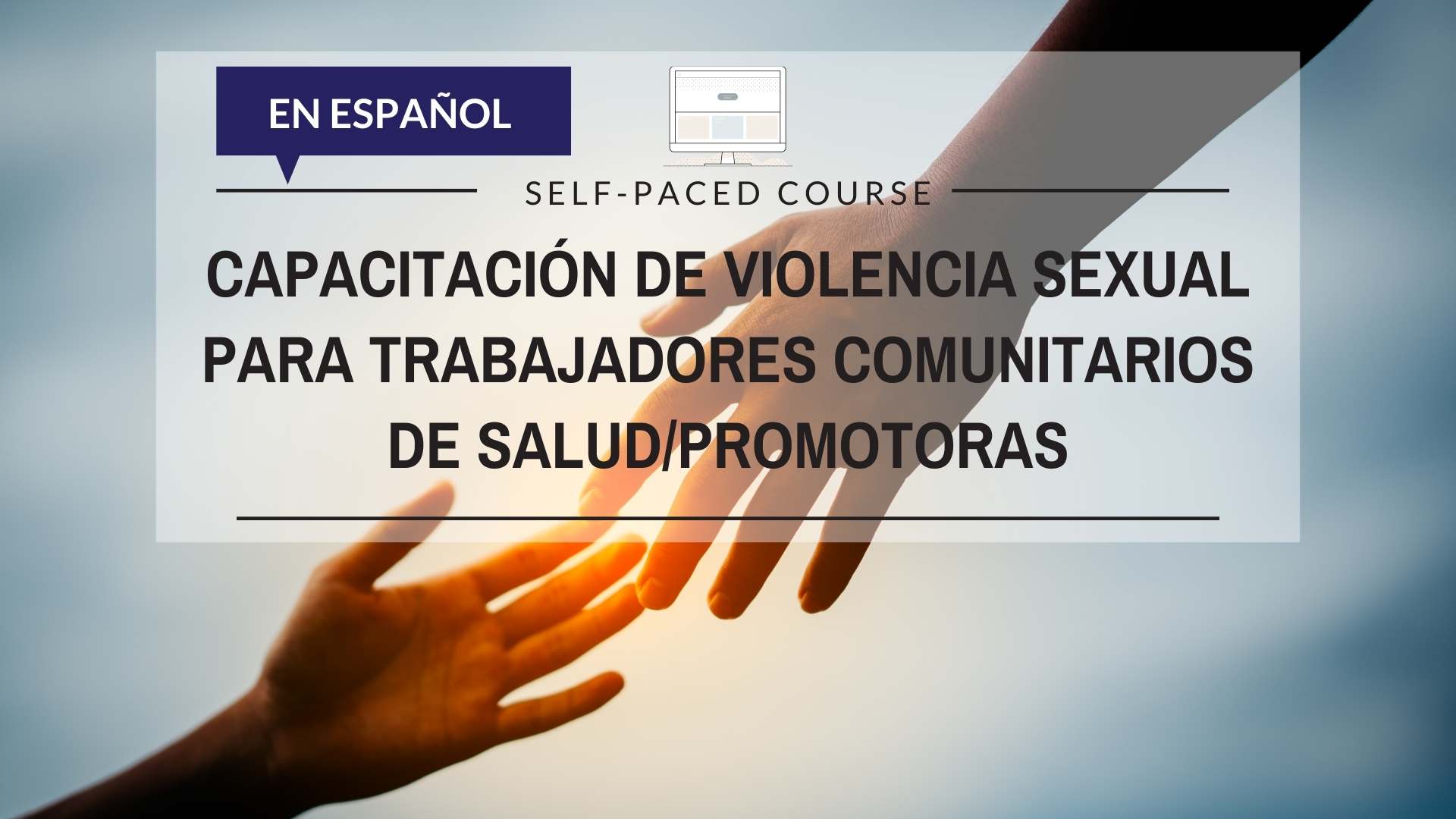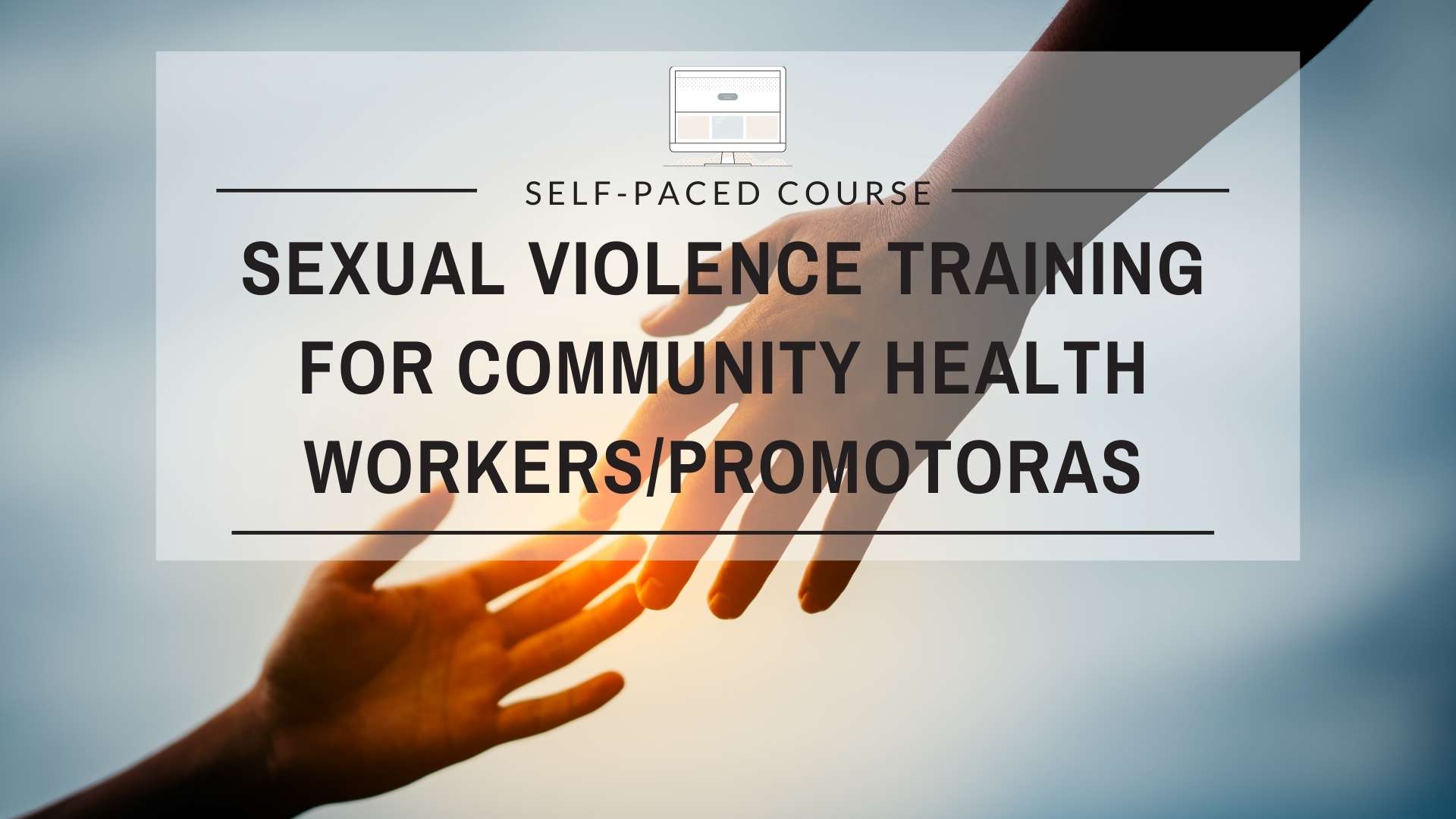Este curso presenta conocimientos básicos y habilidades útiles para ayudar y responder a las víctimas de violencia sexual. El curso consta de seis módulos a su propio ritmo, que incluyen actividades de reflexión, videos, preguntas de autocomprobación y un escenario de juego de roles. Se incluye una colección de recursos integrales para su uso posterior.
Objetivos de aprendizaje:
- Identificar la violencia sexual y definir los tipos de violencia sexual.
- Responder adecuadamente a las víctimas de violencia sexual.
- Relacione su papel con el papel de otros socios de la comunidad en la respuesta y el apoyo a las víctimas de violencia sexual.
- Reconocer los signos de agotamiento y trauma vicario y las formas de sobrellevarlo.
Audiencia objetiva: Trabajadores de salud comunitarios, enfermeras registradas, dietistas registrados y otros profesionales de la salud pública
Duración: aproximadamente 2 horas
Información de educación continua: 2.0 Continuing Competency Credits for CHES
Número de proveedor de CHES: 99036
Formato: Capacitación basada en la web, auto-aprendizaje
Creado/Actualizado: Nov. 2021
Autores: Arizona Rural Women's Health Network, Arizona Coalition to End Sexual and Domestic Violence, Western Region Public Health Training Center
Narrado por: Dulce Rodriguez, BS, Western Region Public Health Training Center
Divulgaciones: Los planificadores, revisores y autores no tienen conflictos de intereses declarados.

This training presents information about intimate partner violence and the role of healthcare providers. The assessment includes a virtual role play, where you will have a chance to apply the knowledge and skills you learned in the training.
Learning Outcomes:
- Understand the definition of intimate partner violence and the types of controlling and coercive behaviors.
- Identify common medical conditions and clinical signs associated with intimate partner violence as well as behavioral clues of both the patient and the abuser.
- Develop techniques for effectively screening for intimate partner violence, including responding to disclosures and non-disclosures.
Target Audience: Community Health Workers, Registered Nurses, Registered Dietitians, and other health care professionals
Duration: 45 min
Continuing Education Information: none available
Format: Web-based training, self-study
Created: 1/2018
Authors: Judy Hendersen, MEd. Mgt., Sara Hanafi, MPH, Nevada Coalition to End Domestic and Sexual Violence, Kelly Morning, MPH, Nevada Public Health Training Center
Presenter: Sara Hanafi, MPH

Learners will develop an awareness of the dynamics of domestic violence
and sexual violence specific to immigrant populations to be able to implement
appropriate interventions for victims of domestic and sexual violence.
Section 1: Module 1 and 2-Understanding the Unique Contexts for Immigrant Victims of Sexual and Domestic Violence
- Essential Information
- The Power and Control Wheel
- Recommendations and Resources
Section 2: Module 3- Legal Remedies for Immigrant Victims under the Violence Against Women Act (VAWA)
- Essential Information
- VAWA Self-Petitions
- U Visas
- Legal Advice vs. Legal Information
Section 3: Module 4-Two Women’s Stories
- Video-Documentary of two women’s personal stories and their journey through the process of seeking help as a result of violence and abuse
- Case Simulation-Culminating activity that takes the learners through the assistance process applying the course principles and objectives.
Learning Objectives:
- Understand how the “Power and Control Wheel” defines and outlines intimidation characteristics used by abusers to control their victims.
- Guide immigrant victims of sexual and domestic violence to agencies and resources that support this population.
- Describe to clients the process of applying for residency in the US through VAWA self-petitions and U Visas.
- Understand the difference between Legal Advice and Legal Information.
- Practice counseling and guiding clients in understanding the self-petition process outlined in the trainings.
Target Audience: Educators/ Trainers, General Public Health Staff, Case Manager, Human Services
Duration: 1 hour
Continuing Education Information: 1.0 CECH for CHES
Format: Web-based Training, Self- Study
Created/
Updated: 1/30/2017
Authors: Pima County Immigrant Victims of Violence Task Force

This course introduces basic knowledge and skills useful in assisting and responding to victims of sexual violence. The course consists of six self-paced modules, which include reflection activities, videos, self-check questions, and a role-play scenario. A collection of comprehensive resources for further use are included.
Learning Objectives:
- Identify sexual violence and define types of sexual violence.
- Respond appropriately to victims of sexual violence.
- Relate your role to the role of other community partners in responding to and supporting victims of sexual violence.
- Recognize signs of burnout and vicarious trauma and ways to cope.
Target Audience: Community Health Workers, Registered Nurses, Registered Dietitians, and other public health professionals
Duration: approximately 2 hours
Continuing Education Information: 2.0 Category 1 CHES Credits, 2.0 Continuing Competency Credits
CHES Provider number: 99036
Format: Self-paced online training
Created/Updated: Nov. 2021
Authors: Arizona Rural Women's Health Network, Arizona Coalition to End Sexual and Domestic Violence, Western Region Public Health Training Center
Arranged by: Allison Root, DrPH, MS, RDN, Western Region Public Health Training Center
Narration by: Allison Root, DrPH, MS, RDN and Lorraine Ramirez, MPH
Disclosures: The planners, reviewers, and authors have no declared conflicts of interest.

